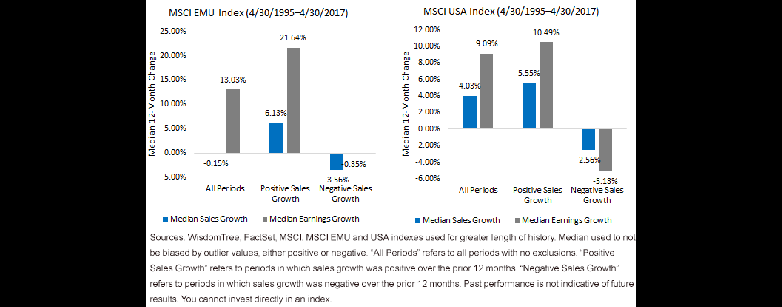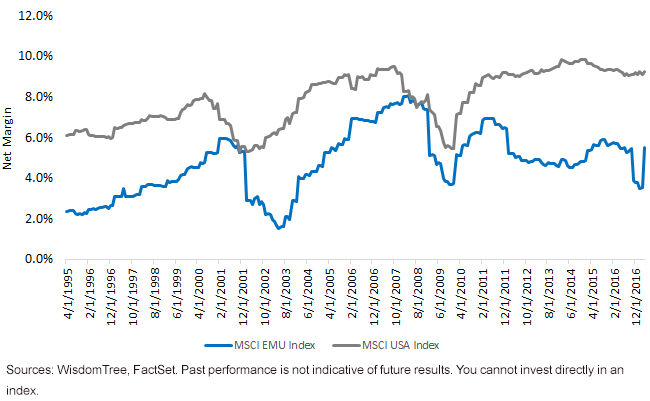USA vs. Europe—Where Should I Allocate Today?


Despite the surprise outcome of the recent British parliamentary election, investors contemplating what could have been during a spring of political risk events should feel relatively comfortable about where we are as we head into the summer. With the specter of the French election, the major European political risk event for the year, firmly in the rearview mirror without an extreme-left- or right-leaning president, investors should be able to look past headlines and focus on the fundamentals of European equities. We are far from the only ones coming to this conclusion, as a recent cover of Barron’s even said to “Buy Europe” in the headline.1
Operating Leverage: Top-Line Growth to Bottom-Line Profits
One reason to look outside the United States is based on developed markets outside of the U.S. exhibiting higher operating leverage—which means that growth in sales translates to earnings in a bigger fashion.
Operating Leverage Has Favored the Eurozone Relative to the U.S.

- These charts show how changes in median sales growth transferred through the income statements of the index constituents—in aggregate—into bottom-line earnings. In the eurozone, the median earnings growth to sales growth ratio was much higher than what we saw in the U.S. over this 22-year period.
Margins Have Favored the U.S., but Margin Growth May Favor the Eurozone
Trailing 12-Month Net Margin (4/30/1995–3/31/2017)

Margin Reversion to Mean?
The U.S. has certainly experienced very strong profit margins relative to other regions for the better part of a decade. But there are questions about how sustainable these levels are—or whether they can meaningfully improve from current levels. If the eurozone can begin to grow its profit margins faster than the U.S., that’s something that would tend to favor allocating to eurozone equities over U.S. equities.
The Great Debate: How Should One Access Eurozone Equities Today?
The results of the French presidential election were quite helpful to improve sentiment and the perception of risk in Europe. Money has flowed and is likely to continue to flow in that direction, but where it goes will tend to be influenced by one’s opinion on a few big questions, including the two that follow.
To Take or Not to Take Exposure to the Euro/Dollar Exchange Rate?
To hedge or not to hedge? While the most common refrain that we hear from most investors is having little to no expertise in currency, it is extremely tempting to try to time when you do (or don’t) want to have exposure to the euro versus the U.S. dollar. Today, because many perceive former euro risk to be tied to the French presidential election, many think that they should be “unhedged” and that the success of any eurozone investment must be “gift-wrapped” with an appreciating euro.
- Our view is that too much bullishness on the euro near-term may be misplaced. Greece hasn’t been figured out. Italian banks haven’t been figured out. The risks of Brexit’s ramifications should be even more apparent after the hung Parliament result of last week’s election. The European Central Bank (ECB) is still printing money aggressively, the deposit rate is still -0.40% and ECB President Mario Draghi continued his dovish stance in comments after last week’s ECB monetary policy meeting.
- Without any clear view on the direction of the currency, we believe the true neutral position in the currency is to start from a hedged position and only add in the euro if one is bullish on its potential for appreciation.2
Is Europe a Play on Global Growth or Internal Growth?
Some of the eurozone’s largest companies derive a great deal of revenue from external regions, such as emerging markets. Others are much more internally focused. A refrain that we tend to hear along this line is that the pessimism on the eurozone itself was too extreme, there can be a recovery and the actual results may not be as negative as what was initially thought.
- Our view is that a market capitalization-weighted index, like the MSCI EMU Index, is not providing exposure to domestic Europe, as it will include large weights in large exporters. The WisdomTree Europe Domestic Economy Index was designed so that every constituent must derive more than 50% of revenue from inside of Europe, making the true exposure reflect what is happening inside of Europe as opposed to globally. The WisdomTree Europe Hedged SmallCap Equity Index is also quite domestic in its focus, although it lacks the same revenue screening requirement. Small-cap stocks are inherently domestic.
Europe Should Be a Strategic Allocation
Recently, we have seen political turmoil rear its head in both the U.S. and in Brazil, and in the past few years we’ve learned to continue to expect the unexpected. In our opinion, the long-term fundamental and valuation case for Europe is strong, but political and geopolitical surprises always have the potential to cloud the short-term picture. Whether it is from a currency-hedged starting point to focus on the valuation of stocks while neutralizing the impact of currency or the more local domestic-focused position, WisdomTree offers unique tools to access a recovery in European markets.
1Source: Vito J. Racanelli, “Europe on Sale: Time to Buy Foreign Stocks,” Barron’s, 5/13/17.
2Source: Bloomberg, as of 5/19/17.Important Risks Related to this Article
Investments focused in Europe increase the impact of events and developments associated with the region, which can adversely affect performance.

Christopher Gannatti began at WisdomTree as a Research Analyst in December 2010, working directly with Jeremy Schwartz, CFA®, Director of Research. In January of 2014, he was promoted to Associate Director of Research where he was responsible to lead different groups of analysts and strategists within the broader Research team at WisdomTree. In February of 2018, Christopher was promoted to Head of Research, Europe, where he was based out of WisdomTree’s London office and was responsible for the full WisdomTree research effort within the European market, as well as supporting the UCITs platform globally. In November 2021, Christopher was promoted to Global Head of Research, now responsible for numerous communications on investment strategy globally, particularly in the thematic equity space. Christopher came to WisdomTree from Lord Abbett, where he worked for four and a half years as a Regional Consultant. He received his MBA in Quantitative Finance, Accounting, and Economics from NYU’s Stern School of Business in 2010, and he received his bachelor’s degree from Colgate University in Economics in 2006. Christopher is a holder of the Chartered Financial Analyst Designation.

